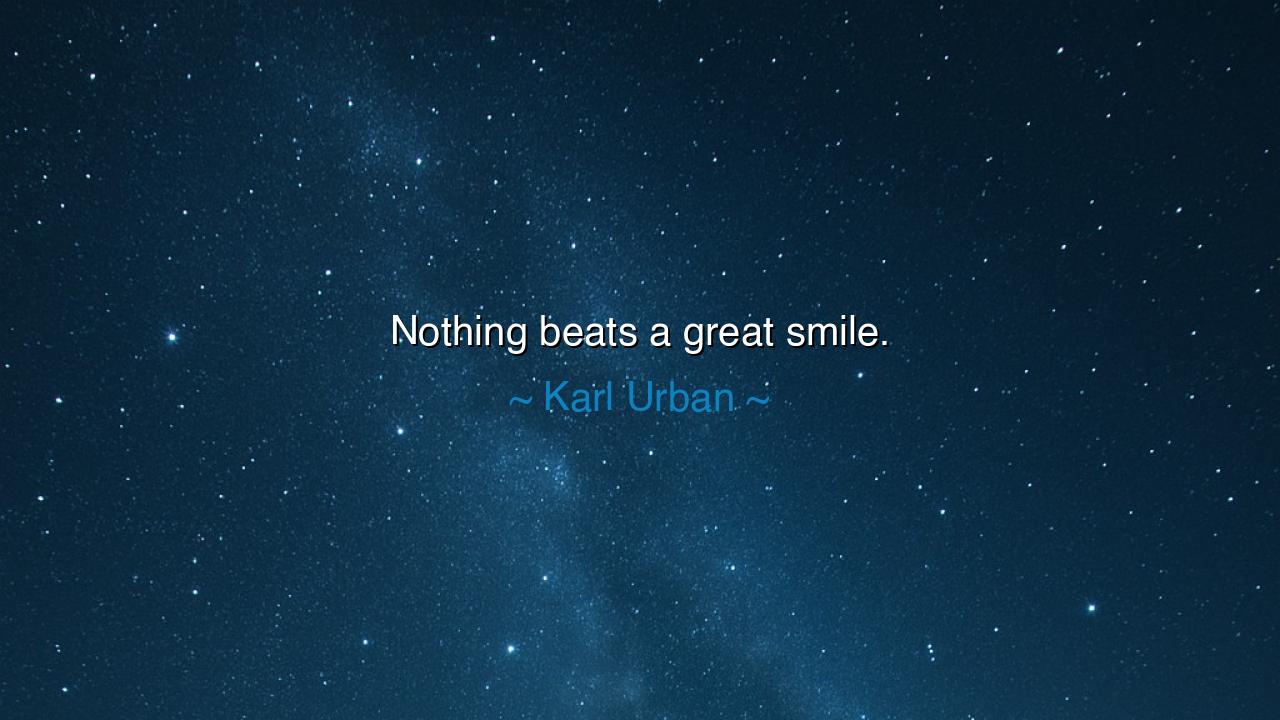
Nothing beats a great smile.






Hear the words of Karl Urban, actor and storyteller, who declared with clarity and conviction: “Nothing beats a great smile.” Simple though these words may sound, they carry the weight of eternal truth. For kingdoms have risen and fallen, battles have been fought, inventions have reshaped the earth, yet none of these can rival the quiet, disarming, universal power of the smile. It is the language of peace, the herald of goodwill, the sign of a soul willing to share its light with another. Truly, nothing stands higher.
The origin of this truth lies in the very design of humanity. The smile transcends tongue, nation, and creed. It is understood without translation, a signal older than speech itself. Before man learned to carve words into stone or inscribe law upon parchment, he knew how to raise the corners of his mouth, to show another being that there was no threat, only welcome. In this way, the smile is the first treaty, the oldest covenant of peace, the most enduring bond of trust.
Consider the story of Mother Teresa, who, in the slums of Calcutta, carried no riches, wielded no armies, and possessed no throne. Yet she bore upon her face a radiant smile that lifted the dying, comforted the abandoned, and restored dignity to the forgotten. World leaders honored her, not for her wealth or intellect, but for the warmth of her presence. She proved the truth of Urban’s words: even amidst suffering, nothing conquers the human heart like a genuine smile.
The ancients, too, knew of this power. In the East, the sages of China taught that to greet another with serenity and a pleasant countenance was to harmonize the energies of the world. In Rome, emperors who mastered the battlefield often softened their image with statues that bore faint smiles, for they knew that fear could command, but only goodwill could inspire loyalty. Even in the lore of Greece, the goddess Aphrodite was said to wield not weapons, but beauty and charm, turning hearts with the simple force of delight.
What makes the smile so mighty is not that it erases sorrow, but that it transcends it. It can shine through tears, defy despair, and soften anger. Think of Nelson Mandela, who emerged from 27 years of imprisonment with a smile that disarmed his enemies and transformed a nation. His was not a hollow grin, but the testament of a spirit unbroken, a beacon to those who believed reconciliation was impossible. That smile was stronger than chains, greater than hatred, and it proved again: nothing beats a great smile.
The lesson is clear: strength and greatness do not always roar like thunder; sometimes they shine quietly, like sunlight upon the face. To wield a smile is to carry within yourself a power that does not coerce but inspires, does not wound but heals. It is available to all—child and elder, rich and poor, mighty and humble. Yet it must be genuine, born not of pretense but of love, for only the true smile carries the fragrance of the soul.
Therefore, beloved, let this be your practice: in moments of triumph, share your joy with a smile; in moments of trial, lift your spirit and gift the world the courage of your smile. Let it be your weapon against bitterness, your offering of peace, your daily ritual of light. For though the world bristles with weapons, crowns, and treasures, as Karl Urban has declared, nothing beats a great smile—for it is the one gift that can conquer hearts without a single blow.






AAdministratorAdministrator
Welcome, honored guests. Please leave a comment, we will respond soon